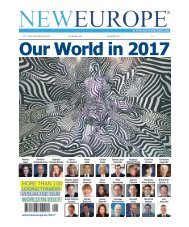OUR WORLD - Perspectives on Artificial Intelligence
You also want an ePaper? Increase the reach of your titles
YUMPU automatically turns print PDFs into web optimized ePapers that Google loves.
PERSPECTIVES ON ARTIFICIAL INTELLIGENCE<br />
Digital Rights in the Age<br />
of Super <strong>Intelligence</strong><br />
By Eva Kaili<br />
Eva Kaili<br />
Member of the<br />
European Parliament<br />
from Greece (S&D),<br />
Chair of the Panel for<br />
the Future of Science<br />
and Technology<br />
(STOA), Member of the<br />
Committee <strong>on</strong> Industry,<br />
Research and Energy,<br />
Substitute Member of<br />
the Special Committee<br />
<strong>on</strong> <strong>Artificial</strong> <strong>Intelligence</strong><br />
in a Digital Age<br />
In our transforming world, digital technology<br />
has the critical mass to push our fr<strong>on</strong>tiers and<br />
release unlimited potential. As the wave of digital<br />
transformati<strong>on</strong> soars high, improving our lives,<br />
industries and ec<strong>on</strong>omies, we must not overlook<br />
the risks that technologies and innovati<strong>on</strong>s pose<br />
<strong>on</strong> the fairness and cohesi<strong>on</strong> of our societies, and<br />
our rights as European citizens.<br />
Through the c<strong>on</strong>structi<strong>on</strong> of vast digital<br />
infrastructures, which track, m<strong>on</strong>itor and collect<br />
pers<strong>on</strong>al data at scale, major <strong>on</strong>line platforms<br />
are commodifying our data. An entire ecosystem<br />
of apps and companies c<strong>on</strong>trols huge data flows<br />
and ‘treats’ technology users as data suppliers via<br />
the impositi<strong>on</strong> of default choice architectures.<br />
The current form of ‘computati<strong>on</strong>al governance’<br />
in which we are ruled by algorithms and predictive<br />
analytics which make use and trade of individual<br />
human experiences to produce predicti<strong>on</strong>s<br />
of human behaviour has largely remained<br />
unregulated. We can still be in c<strong>on</strong>trol of safe AI,<br />
trustworthy and complimentary to humans.<br />
AI is at the core of this wave of digitisati<strong>on</strong>;<br />
the power it carries must be tamed before it is<br />
unleashed in its next form of super intelligence.<br />
Manifested in both software and hardware<br />
with intelligence expressed in lines of code and<br />
powerful automati<strong>on</strong>, it is already being used to<br />
solve complex problems, discover patterns or<br />
predict traffic, and make suggesti<strong>on</strong>s to users. AI<br />
is also tested for completely aut<strong>on</strong>omous vehicles,<br />
as deep machine learning could make decisi<strong>on</strong>s<br />
faster, safer and better than people. Progress<br />
remains incremental, however the more we<br />
advance our understanding and the further we<br />
develop this technology, the closer we reach the<br />
point where AI leaps from narrow to general,<br />
and then super intelligence. Narrow AI is already<br />
making simple suggesti<strong>on</strong>s and decisi<strong>on</strong>s at the<br />
service of people; however, the next level of AI<br />
sophisticati<strong>on</strong> can completely omit humans from<br />
the process and reach levels that humans will not<br />
be capable to understand or c<strong>on</strong>trol anymore.<br />
As most of human activity and industry has<br />
moved <strong>on</strong>line during the pandemic, and we<br />
become more dependent <strong>on</strong> an increasing amount<br />
of digital services, a series of critical questi<strong>on</strong>s<br />
arise: How can we build data infrastructures that<br />
recognise the role of data as a public good? Can<br />
we foresee an impartial system of data governance<br />
that could rec<strong>on</strong>cile the ast<strong>on</strong>ishing potential of<br />
these technologies with their significant human<br />
downsides? Do we as citizens know that when we<br />
use a search engine to find something <strong>on</strong>line, the<br />
engine is learning by searching us as well? Does the<br />
collecti<strong>on</strong> and processing of behavioural data by<br />
these technology platforms threaten to dismantle<br />
democracy and undermine the rule of law?<br />
To tackle these questi<strong>on</strong>s we need to come up<br />
with novel, innovative resp<strong>on</strong>ses, so that we make<br />
our future better than the grim outlook predicted in<br />
Black Mirror, the popular Netflix series. We have to<br />
be aware and cautious in designing the appropriate<br />
framework for AI; intelligent systems are used <strong>on</strong><br />
the pandemic fr<strong>on</strong>t for rapid COVID diagnosis<br />
and prognosis based <strong>on</strong> AI-enabled CT scanning<br />
analysis. AI systems are used now to upgrade our<br />
mapping systems, the management of resources,<br />
to make our mobility smarter, our agriculture more<br />
precise, with predictive maintenance and smart<br />
sensors that can c<strong>on</strong>tribute to a greener future,<br />
saving time, energy, and resources.<br />
As the impact of exp<strong>on</strong>ential technologies<br />
grows, a new framework is needed in Europe to<br />
harness its benefits and mitigate its risks. This<br />
framework must be built <strong>on</strong> ethical principles and<br />
binding standards, which elevate people’s trust in<br />
AI and ensure that in the digital age, people co-exist<br />
with intelligent systems without fearing exclusi<strong>on</strong>,<br />
manipulati<strong>on</strong>, oppressi<strong>on</strong> or discriminati<strong>on</strong>.<br />
20 January 2021 | <str<strong>on</strong>g>OUR</str<strong>on</strong>g> <str<strong>on</strong>g>WORLD</str<strong>on</strong>g>










